"Consideration of particle emission from black holes would seem to suggest that God not only plays dice, but also sometimes throws them where they cannot be seen." -Stephen Hawking
Last week, I wrote about how high-energy cosmic rays strike Earth's atmosphere and wind up bombarding everything on Earth's surface with super-fast moving particles, some of which are even unstable!
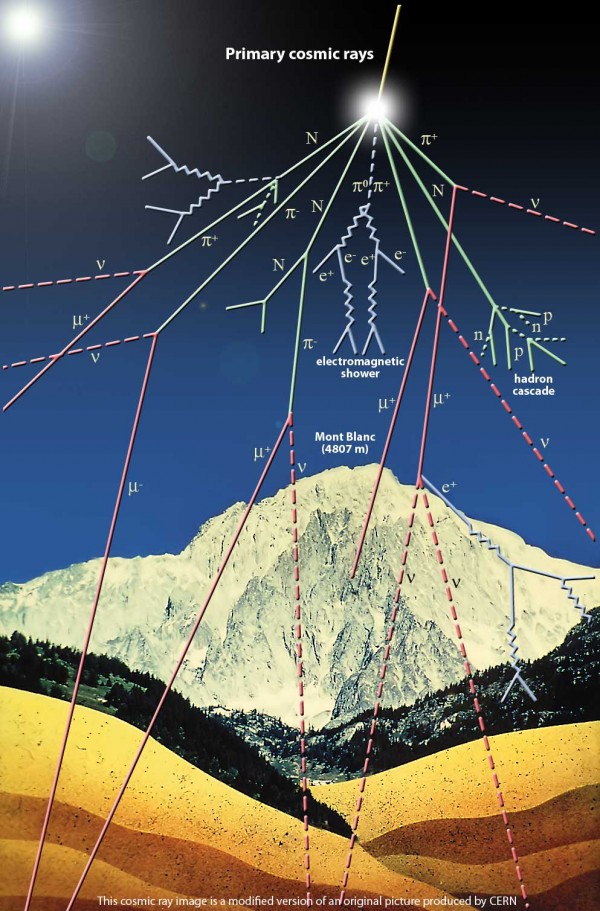
In passing, I mentioned that these cosmic rays (mostly protons) come from a variety of sources, such as the Sun, neutron stars, supernova remnants, the centers of galaxies, and (everyone's favorite) black holes.

(Above is a starburst galaxy, with light from cosmic rays colliding with the interstellar/intergalactic medium shown in false color.)
As always, there were some very good comments on the post, including one that took me to task for the black holes statement:
How does anything 'come from' a black hole?
Aaah, black holes, quite possibly the suckiest objects in the Universe.
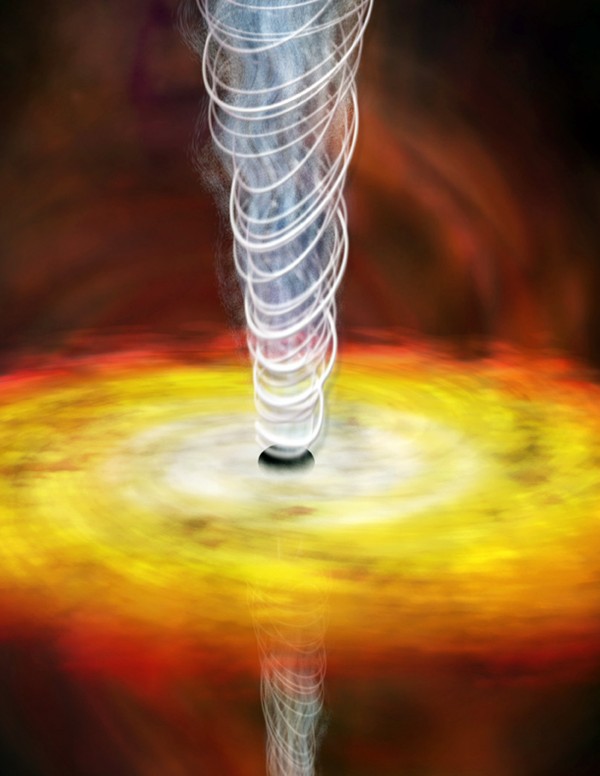
So, how about it? Everyone knows that the definition of a black hole is that it's something so dense and so massive that nothing -- not matter, not anti-matter, not even light -- can escape from behind the event horizon of a black hole. And this is true!
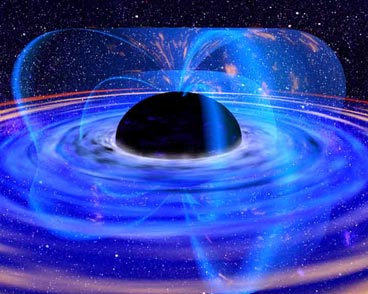
But near a black hole, just outside the event horizon, there's some incredible stuff going on. First off, the matter. Every black hole has a flat disc of matter orbiting it at an incredibly high speed. Due to forces like friction and gravitational tides, the matter gets ripped apart into individual molecules, atoms, and subatomic particles, and eventually spirals in towards the center.
So we wind up with -- somewhat close to the event horizon -- a bunch of small, fast-moving, and charged particles. But the black hole, like all star-type objects, has a magnetic field. Unlike the Earth, which has a magnetic field of about 0.6 Gauss at the surface, or the Sun, which can reach a field strength of up to 4,000 Gauss on a Sunspot, a black hole can have magnetic fields in excess of 1,000,000,000,000 Gauss!!
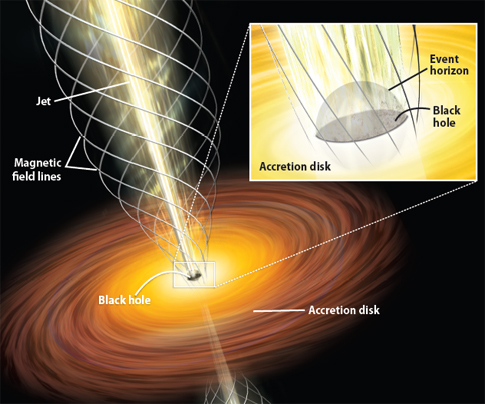
And while these charged, fast moving particles spiral in toward the black hole's center, they feel the effects of the magnetic field. What effects are those?
It turns out that a basic law of physics is that, if you hold your right hand in an "L" shape (fingers together, thumb out), and point your fingers in the direction of the magnetic field and thumb in the direction the particle is moving, your palm "pushes" the particle perpendicular to both directions!

This causes black holes to suck these particles up and down, perpendicular to the disk, and shoot them out at ultra-high speeds in two jets!
And if one of those jets happens to be pointed towards you, are you ever in for a treat!
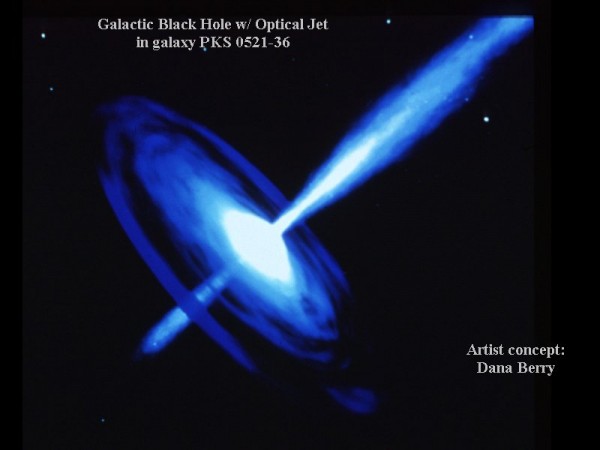
It's a cosmic ray feast! Courtesy of your friendly neighborhood black hole, of course.
And that's how a whole slew of ultra-high energy particles can come, without any problems at all, from a black hole! So enjoy the cosmic ray showers, and I hope this takes you into a great weekend!

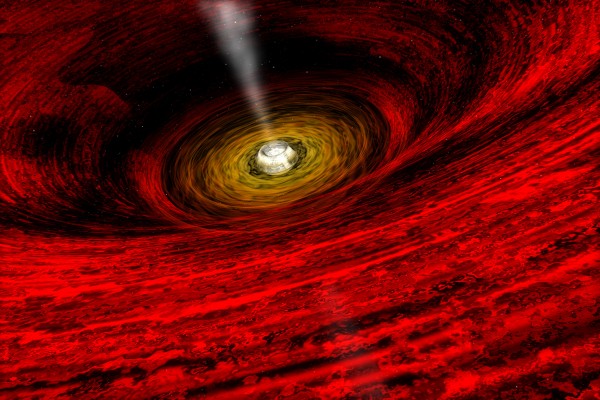
Can't black holes also emit virtual particles who's pair appeared on the other side of the event horizon? Or did I misunderstand that somewhere along the way...Thanks and Great Blog!!
@Tim #1 I guess you mean Hawking radiation?!
I wonder is it possible to extract energy from the matter revolving around a black hole?
The forces acting at different directions (fictitious force) also calls to mind a gyro whereby if you apply external force in one direction it goes off in another which may be perceived as a local gravitational type of effect. In keeping with a theme of having fun with physics I guess we could view any black hole as a local gravitational effect that could be "pushed" in an otherwise unexpected direction by whatever forces the rest of the local universe has to offer.
If a black hole's jet is pointed right at you, you'll die. Read Eater by Gregory Benford for examples.
In principle, it certainly is.
Indeed, it is even possible to extract energy from a rotating black hole itself (and in the process, slow its rotation). The basic idea is that you drop a particle towards the black hole, and the rotating gravitational field will fling the particle out with energy that can be used.
I believe Hawking has since reversed his view on this; he now thinks that no information is permanently lost in black holes.
So what proportion gets tossed out, and how much falls through the event horizon?
According to Susskind, the black hole evaporation period is 10^60 years years to detect any change in mass or size. That's a note I made from page 200 of 'The Black Hole War' which I have since returned to the public library. I wonder what sizes black holes come in?
Concerning black hole dynamics;
On the surface, data from Hubble seems to indicate that galaxies in a local cluster collide in any number of super positions though there is one that has not been observed (AFAIK),
and that is the stable jet to jet configuration of the opposing black holes with their corresponding galactic constituents. The spin and gravitational attraction may precursory account for the collision/merger, yet within closer parameters we may see a magnetic alignment that may govern the actual merger dynamics.
We see M87 shining it's light/jet in our direction from 55 Mly away,M87/NGC 4486 in the Virgo cluster being the largest cluster of our local super-cluster in which we reside in a separate local group which leads to the question of how close does a neighboring galaxy have to be to significantly magnetically influence another galaxy?
I find it highly unlikely that any major galactic body contained within a local group to have a stable jet to jet configuration with another attracted galactic body within the same group, the science for this realm of magnetic fields is in it's infancy.
Further a field still, when the combined influence of local groups act upon other local groups should indicate the over all absence of jet to jet alignment of galaxies compared to galaxies in opposing local cluster within a super-cluster.
So it would seem the statement:
"And if one of those jets happens to be pointed towards you, are you ever in for a treat!"
Stands
and regarding the statement:
"If a black hole's jet is pointed right at you, you'll die. Read Eater by Gregory Benford for examples."
In my opinion it would be very unfortunate and highly unlikely in an evolved local group such as ours.
They certainly do suck! Or as Butt-Head described them during a Soundgarden video: "A black hole is like this giant bunghole in outer space. It like, it sucks up the whole universe, and then it like grinds it up, and like sends it all to hell or something." Surprisingly accurate! :D
Very nice and informative post.
So, is the idea of an astronaut just drifting across an event horizon, now a discredited theoretical idea?
Do the largest magnetic fields ocurr in the largest black holes (i.e. center of galaxy black holes)?
Is a non-rotating black hole now considered an unlikely theoretical anomaly and the rotating black hole the more usual phenomenon?
Are such incredible strong magnetic fields sufficient to magnetically align galactic center black hole and stars, galaxies within a cluster, etc.?
Late to the show, but one question based on the anti-matter statement. Is a black hole still matter or anti-matter, or does the state degenerate to not distinguish between the two?
An ideal, theoretical, black hole is a purely gravitational phenomenon. It is a feature of curved spacetime described by Einstein's theory; it involves no matter (or anti-matter) at all.
In the real world, black holes are formed by the collapse of stuff out in space, and that stuff is almost all matter (as opposed to anti-matter).
any stephen hawking books in largetype?
"But the black hole, like all star-type objects, has a magnetic field."
Do you mean the black hole itself has a magnetic field, or does its accretion disk generate this field?
Anyone ever think to link black holes to dark matter?...
As the matter we know dissapears into the black hole, it is fundamentally changed to dark matter.
Hmmmmmm....
thanx 4 givin wonderful xplanation about black hole
it is good for all student
it is good for all student.